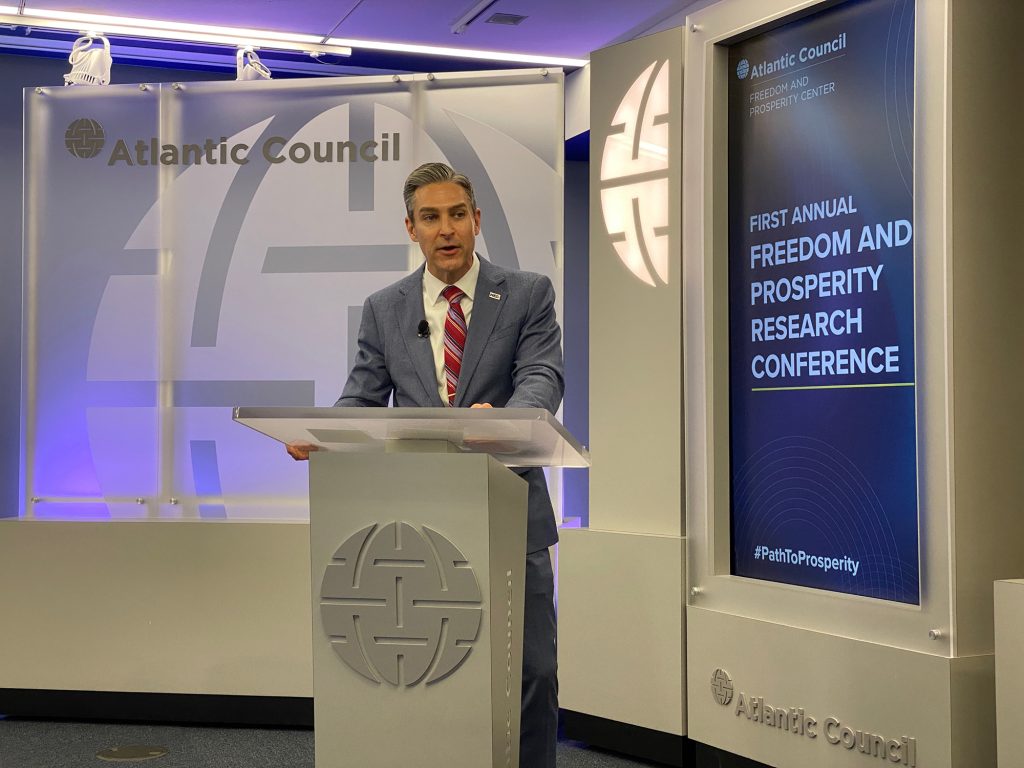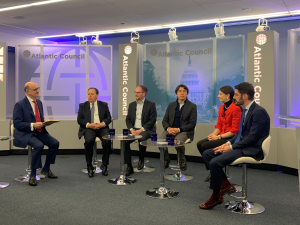Watch the event
Event transcript
Uncorrected transcript: Check against delivery
Speakers
Damon Wilson
President and CEO, National Endowment for Democracy
DAMON WILSON: I have to tell you, it is a real honor not to just be at the first annual Freedom and Prosperity Research Conference; to be back here at the Atlantic Council. It feels like home. And I just want to acknowledge I’m so proud that the Atlantic Council picked up on the ideas that Michael had and had the initiative to take this out and build this initiative. So kudos to you, Dan, Matt Kroenig, [and] others who made this a reality; to Fred for helping to really make this work; and [to] Michael for bringing this vision here.
I’m also—I was a champion of this at the very beginning when I—when I heard these ideas, and I’m really proud that at the National Endowment for Democracy, that many of the ideas that you’re working on here underpin much of our philosophy. And that’s why I’m delighted that Andrew Wilson and his team [are] here with the Center for International Private Enterprise, one of the core institutes within the NED family, that is premised on the idea that healthy democracies require healthy economies, entrepreneurs, a vibrant market that can work with rule of law. And delighted to have my own board members who are here as well, Kelly and others, who are joining as part of this conversation. I just saw you, Ambassador Currie.
And while I was present at some of the early creation, Dan, I’m almost embarrassed to be offering remarks at the opening because I’m here more to be your cheerleader for the concept and, frankly, more eager to learn from the research that you’re undertaking, particularly those of you who are participating here in the room and online, because I’m an enthusiastic believer in the premise of unlocking the potential of people. It’s a pretty simple concept, and yet it’s powerful. Whether it’s being effective in how to manage a young team of intellectual entrepreneurs in an organization like the Atlantic Council; the next generation of political leaders that are going to drive reform; or entrepreneurs that are going to be at the heart of jobs, growth, and innovation; and together to think about how democracy, rule of law, and prosperity, markets, are key to an effective war on poverty, I think that’s really compelling.
Now, to many of us, that case seemed obvious. You look at some of the infographics the Center’s already produced and they sort of intuitively knew this. We could look at North and South Korea and now we understand the data—fifty-one times larger per capita [gross domestic product] North to South. We sort of understood that looking at West and East Germany in the 1990s, three-and-a-half times the size; looking at what was a free Hong Kong and Taiwan compared to China. And it felt in the 1990s and decades after is that maybe this was—this obvious thing would accelerate and become sort of a norm.
But it’s not so obvious. Since then, we’ve seen a real challenge: a 2008 financial crisis that maybe originated on Wall Street but led to global shocks and a recession; periods of slow growth; really a backlash even from Iraq, a misconception of thinking of Iraq as democracy promotion and then undermining that concept; the legacy of a North-South divide coming to a head. And you lay on top of this the rise of the PRC, the rise of China, and which started to scratch as a model of autocratic capitalism. Hmm, millions out of poverty; what does that have to say?
And we’re here at a time when President Biden has framed a big global debate between democracy versus autocracy, but in some respects, it’s a little bit more nuanced. It’s a little bit broader. It is a test in models, with average people coming to conclusions—democratic capitalism or autocratic capitalism—and they see the PRC at the head of this autocratic-capitalist camp.
And the truth is, it’s the allure of a more effective, perhaps easier path to prosperity, without a lot of noise of debate that comes in a democratic society, like India, the partnership that comes, as you see in the United States, or compromise that’s required in democracies around the world. At first, it was reinforced even by this pandemic; the perception that maybe autocrats are managing this pandemic better.
But I think the truth really is that it’s a more attractive option not for people. It’s a more attractive path for autocratic rulers to hold onto power and get rich. It’s not about their people. It’s about autocratic elites who want to get rich and hold on to that power.
And so the result isn’t really autocratic capitalism. Autocratic capitalism’s result is really kleptocracy in which it’s taking money from their people. And this has bred a whole international phenomenon that our board member, Anne Applebaum, has written about with “Autocracy Inc.,” in which deals, not ideals, are driving sort of vested interests in autocratic societies to do business together, back each other up, use free societies to their own advantage, and strengthen their own hand on a global terrain. It’s a profound new challenge that we find ourselves in. And I won’t unpack the case here, but we’ve seen it from Russia, Iran, and China at the center of it.
And it’s led some, like Anne, to argue that are the bad guys winning now. Authoritarian resurgence around the world, coupled with democratic erosions, fueled by this profoundly changed landscape, emerging complex challenges, these interconnected trends. It feels like there’s a systemic challenge from autocracies to displace democracies as the leading form of governance. And we see this sharper repression, turbocharged by technology, twisted by a new information environment, the sharing of techniques across borders among autocrats, and helping cement kleptocratic rulers in countries around the world that are not serving the poor, that are not serving their people’s interests. And so you overlay this now on inflation, a food crisis, slow growth.
So what does this mean? Despite all that, you look around the world and you see how the demand for democracy is resilient. Madeleine Albright, before she passed away, is someone who’s really important to the Atlantic Council, [National Democratic Institute], the NED family. She argued that democracy was not a dying cause, but it was poised for a comeback, in her last big article she published, “The Coming Democratic Revival.” But it’s pretty apparent that things don’t just happen. They just aren’t on this automatic cycle. Especially in our world, democracy, it’s not a self-executing proposition.
And I’m really taken by something that Fred wrote in December in his “Inflection Points” newsletter. And he pointed out that at the start of [2022], autocrats from Xi Jinping hosting the Olympics, managing the pandemic, Vladimir Putin, troops around Ukraine, showing up in Beijing for no-limits partnership, the Ayatollah Khamenei in Iran feeling no pressure, that they started off [2022] feeling confident.
And now we see, through their own mistakes, underlying weaknesses in systems, systems that are hard to self-correct, mistakes that have led people to push back, whether it’s Ukrainians, whether it’s the… Russians that are arrested each day protesting war activity, whether it’s incredible courage that it took from Chinese in the white-paper movement to stand up to COVID restrictions, or the inspiration we see from courageous people across Iran arguing for women, life, freedom.
And so the key of your work here is actually—we don’t take that case for granted—how do you build the case [that] democracy is the best pathway for people, for prosperity, for the poor? And Dan, you’re right. I think having understanding this case has to be argued and built from voices, from countries around the world, voices from those in the developing world.
And the goal of the work is to underscore that this isn’t implanting ideas from the ivory tower, but how to support the aspirations of people around the world themselves and their voices, for what’s best for their people. After all, it’s the model of how the Endowment thinks about democracy support. We don’t promote a model, an American model. It’s about how do you support those that are courageous enough to struggle for freedom, understanding it’s their cause, and it’s our honor to support them with humility. So hats off to building in a grants program to what you’re doing.
And to ground it in this research and data, I think it’s so important. We’ve seen already, in the work coming out of the center, free versus unfree countries show that thirteen times wealthier if you live in a free country. But I like how you’ve mapped it out to show that societies are also healthier, happier, more inclusive based on these indexes that you’re tagging. And to be able to demonstrate with data that political, economic, and legal freedoms are crucial to prosperity, I think, is key to demonstrating how democracy can deliver for all of its citizens.
In fact, democracy is the best way to deliver for its citizens and this is ultimately built into the concept of democratic capitalism. To be effective there’s got to be accountability, transparency, a feedback loop from citizens, from consumers, self-correcting mechanisms, a possibility of making mistakes but incentives to fix them and this relentless pressure to be responsive to citizens, the consumers, relentless pressure to reform.
And so I’m really pleased to be here. I’m more excited to hear about the work that’s coming out of this. I really welcome this initiative. Dan had written about how to strip the emotions and politics so that data can do the talking and I think that’s powerful.
But I just want to close with saying the real world involves emotions and it’s a good thing. So how does this work show that results can actually harness or, better yet, unlock, unleash the yearning of the human spirit—that emotion—how people want to control their own destiny, empower principled leaders, innovative entrepreneurs, to prove that democracy can deliver for its citizens. How we invest in our people is this pathway.
So I want to close with—I just came back from Nigeria, thanks to some advice from Peter Pham, who’s with us, and it shows that without sources of prosperity control of government means control of resources and that can undermine democracy delivering, and we see where potential is unleashed where there’s no control and a Nigerian artistic scene, a tech scene in Lagos, things can flourish. That’s why an End SARS movement is now riling the election.
I spent time last fall with North Korean defectors in South Korea seeing incredible young people who weathered incredible hardships in North Korea after just a few short years in freedom in the south becoming extraordinarily productive, creative entrepreneurs and social entrepreneurs.
This is how to show how this applies in the real world. I’m really pleased you’ve got a minister here from Tunisia—I’m headed to Tunisia at the end of the month—because freedom without prosperity leads to trouble. We’ll hear from you about that, populism backsliding.
But we need to recognize that that’s a long journey. That’s why I’m proud of the work you’re doing. I’m excited about the work that the Center for International Private Enterprise is investing in. Without a healthy set of private-sector entrepreneurs, you don’t have a healthy democratic sector and that’s why I think this work is so important to show that freedom delivers prosperity. It helps democracy deliver.

